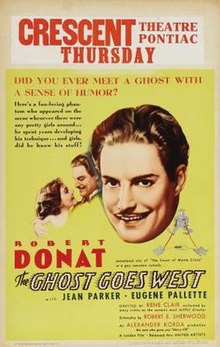The Ghost Goes West
| The Ghost Goes West | |
|---|---|
 |
|
| Directed by | René Clair |
| Produced by | Alexander Korda |
| Written by |
Story: Eric Keown Screenplay: René Clair Geoffrey Kerr Robert E. Sherwood Lajos Biro |
| Starring |
Robert Donat Jean Parker Eugene Pallette |
| Music by | Mischa Spoliansky |
| Cinematography | Harold Rosson |
| Edited by |
Henry Cornelius Harold Earle-Fishbacher |
|
Production
company |
|
| Distributed by | United Artists |
|
Release date
|
17 December 1935 (UK) |
|
Running time
|
95 minutes |
| Country | United Kingdom |
| Language | English |
The Ghost Goes West (1935) is a British romantic comedy/fantasy film starring Robert Donat, Jean Parker, and Eugene Pallette, and directed by René Clair, his first English-language film. The film contrasts an Old World ghost dealing with American vulgarity.
This rather cosmopolitan production combines an Hungarian-born British producer, a French director, and an American writer in a British film. This movie was the biggest grossing movie in 1936 in Great Britain.
Peggy Martin (Parker), the daughter of a rich American businessman (Eugene Pallette), persuades him to purchase a Scottish castle from Donald Glourie (Robert Donat), dismantle it and move it to Florida. Along with the castle goes its ghost.
Murdoch Glourie (also played by Donat) haunts the castle after dying a coward’s death in the 18th century. To find rest, he must get a descendant of the enemy Clan MacClaggan to admit that one Glourie is worth fifty MacClaggans.
Writing for The Spectator in 1935, Graham Greene praised the film, noting in particular how the "camera sense" of René Clair (whose prior films were primarily satiric in nature) manifested itself in the film's "feeling of mobility, of visual freedom" and highlighted Clair's directorial genius. Greene also praised the acting of Pallette and Donat, describing Pallette's portrayal of an American millionaire as the finest performance of his career, and Donat's acting style as imbued with "invincible naturalness".
The film was voted the best British movie of 1936.
It was the 13th most popular movie at the British box office in 1935-36.
...
Wikipedia
